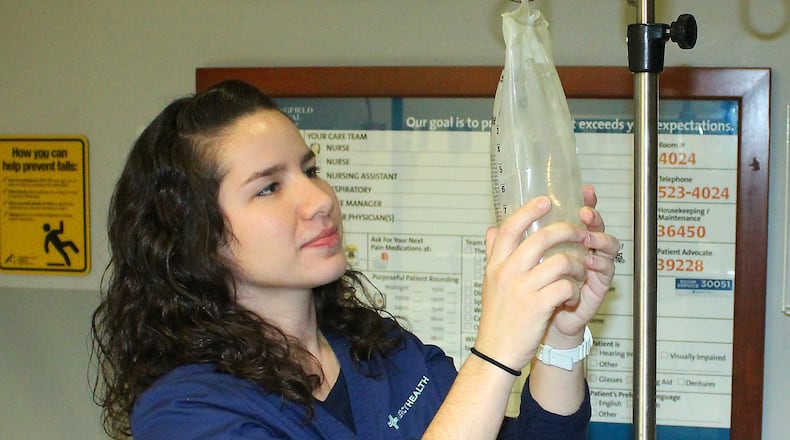MORE: Hospital top Clark County employer, reflects statewide trend
But it has become more serious after Hurricane Maria damaged production facilities in Puerto Rico, and is also occurring at a time when flu activity is widespread across most of the U.S., according to information from the Centers for Disease Control and Prevention.
The IV fluid bag shortages are the result of several factors, according to information from the FDA. That includes consolidation in the pharmaceutical market and production issues at some manufacturing facilities due to quality issues. More recently, shortages have faced additional pressure as a result of Hurricane Maria’s manufacturing plants in Puerto Rico, according to the FDA.
RELATED: Springfield medical center gets $350K expansion
Mercy Health, which provides health-care services in both Clark and Champaign Counties, has seen shortages but its hospitals and other centers are using a variety of methods to address the issue, spokeswoman Nanette Bentley said. The shortage is affecting all of Mercy’s facilities statewide, including the Springfield region.
MORE HEALTHCARE NEWS: New leader of Springfield hospital to focus on patients
“Patient care is always our top priority and a multidisciplinary team comprised of supply chain, pharmacy, nursing, operations, nutrition and others, has been addressing the issue for weeks,” Bentley said. “This team meets regularly to ensure patient care is not impacted by the bag shortages and to determine alternate delivery methods for the drugs and fluids patients need during the course of their care.”
READ MORE: Springfield’s biggest employer changing its name
Mercy medical staff are working around the problem to ensure patients receive the proper care, she said.
“Depending on the drug, we can, for example, administer it orally or via intravenous push administered by a nurse versus an IV bag,” Bentley said. “In other cases, we can use larger bags that remain widely available or administer needed medications that come prepacked in frozen bags. While there is a shortage of the bags, the different delivery methods available to us ensure that all the patients in our care are receiving the care they need when they need it.”
Healthcare providers statewide are also being creative in dealing with the fluid shortage, Ohio Hospital Association spokesman John Palmer said.
“They’re definitely exploring other options as much as possible, waiting until additional supplies can be procured,” Palmer said. “At this point, hospitals are able to determine whether they are able to carry through with anything scheduled or anything that might come up for an emergency standpoint.”
Ohio Valley Surgical Hospital in Springfield couldn’t be reached for comment on if it has seen shortages.
The Ohio Hospital Association isn’t aware of any providers across Ohio who have completely exhausted their ability to treat patients due to the shortage, Palmer said.
“The CDC and FDA were indicating they are working with the manufacturers to try to get additional supplies to help,” he said. “The flu season has spiked a lot, too, which has created even more demand on top of some of these other national events that have occurred.”
DETAILS: Father, daughter team up for surgeries at Springfield hospital
The hospital association is working with state officials and other health-care organizations to react to any emergencies that might arise.
“We have an emergency preparedness initiative that if there is a hospital or a need that is occurring, we are able to quickly tap into a network of other hospitals and health-care facilities that might have those resources to make sure things are addressed and shared,” he said.
Complete coverage
The Springfield News-Sun regularly provides in-depth coverage of important health issues in Clark and Champaign counties, including recent stories on expansions at Rocking Horse Community Medical Center and at Mercy Health-Urbana Hospital.
By the numbers:
2014 — Year limited supplied began
46 — Number of states reporting high flu activity
13.7 — Flu-related hospitalizations per 100,000 people in U.S. since Oct. 1, 2017
Sources: CDC, FDA
About the Author
